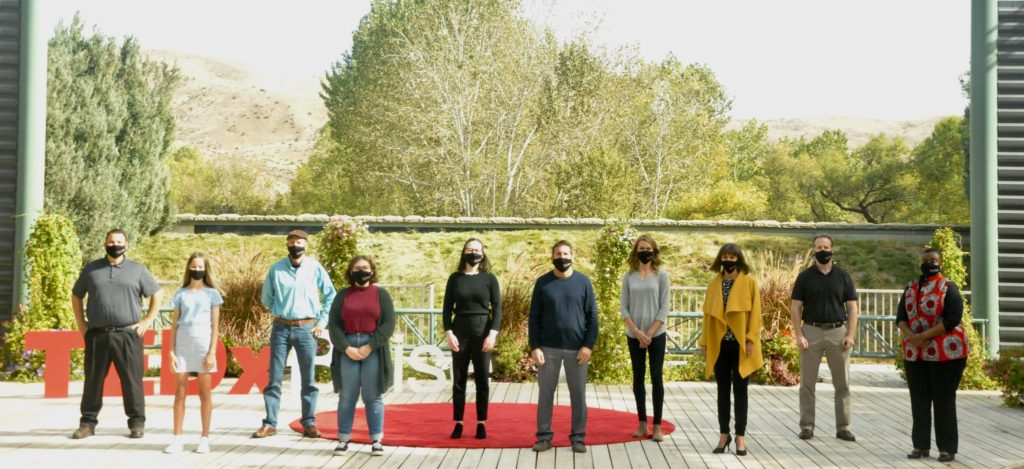Ta-da! TEDx!
I’m dedicating this week’s blog post to the amazing 2020 TEDxBoise speakers.
This group signed on for a six-month effort to build the talk of their lives. That was back in October 2019.
Well, we all know what happened next… COVID.
In March 2020 we postponed the event and plotted a course toward a 2021 event with the same crew. And then we had an opportunity to get our speakers on stage in the fall, thanks to the generous folks at the Idaho Shakespeare Festival. So this resilient crew readied themselves to deliver their talks with just a few weeks of notice.
We are–at long last–ready to share their talks with you.
There are a wide variety of subjects represented in this cohort. I recommend you click through to the TEDxBoise site to read the descriptions and find the ones you’d most enjoy. But if you want to watch the whole thing through (as if you’d been at the event), you can find a playlist here.
I saw firsthand how hard each of these speakers worked on their talks. They didn’t have the benefit of a 400-person audience to help them launch their talks into the world so perhaps you’d be willing to share the ones you enjoyed with your own networks?
Enjoy!
Seeing God in the suffering
It’s pretty easy to feel compassion for Joseph. Despite a seeming lack of emotional intelligence (telling his brothers about his prophetic dreams of ruling over them), being sold into slavery by those brothers into an unfamiliar culture, away from everything he knew and loved, seems incredibly unkind.
God absolutely redeemed Joseph’s experiences—using them to preserve His people through a severe famine. But it’s a difficult story to watch unfold on the pages of Scripture. Betrayed by his brothers and sold into slavery. Framed for sexual assault and imprisoned. Helped fellow prisoners only to be forgotten by one of them for two additional years.
Once finally released, his life begins to change direction. Joseph was elevated to an incredibly high position of authority—second only to Pharoah. He ultimately married and had children.
Reading the account of his life, we naturally feel the pain of Joseph’s hardships—and might even feel righteous anger on his behalf. But Joseph didn’t languish in his own pain.
Read MoreThink your presentation is done? Not so fast.
As speakers and presenters, we need to take a cue from the writing world.
The written word and spoken word need to be structured differently and use different rhetorical devices, syntax, and vocabulary. (This is a challenge that surfaces often when I’m preparing writers for a big talk.)
But one important commonality exists between them:
Read MoreWhen someone imposes on you unfairly
Her comment took my breath away.
I sat in a circle amongst a team of people who—for years—gave their time and talent to lead a local branch of an international ministry. The hours we invested every week in personal study, phone calls, leadership meetings, and the actual ministry activities were many. We all counted them a joy and privilege, a way to serve God and His people with the gifts He’d given us.
And then, one day, I surfaced a challenge to our team. I’d been, in my eyes anyway, mistreated and imposed upon unnecessarily by one of the people we served. I wanted my fellow leaders’ consolation and commiseration. I wanted them to validate my injured feelings and defend me, saying how much I didn’t deserve that treatment… how wrong that other person was.
Which is why her comment was so jarring to me—it was so different than what I wanted:
Read MoreThe problem with most pitch decks (and presentations of all kinds)
Probably more than 90% of the entrepreneurs I help prepare to pitch for funding make the same mistake. (Frankly, more than 90% of all presentations make this mistake.) In a practice session with an entrepreneur this week, it surfaced immediately, on the second slide… and all those that followed.
The problem?
Read MoreWhen we’re in a season of waiting
Does anyone actually like waiting? It feels like doing wall-sits indefinitely.
And we do a lot of waiting in life. We wait…
…on hold with the airlines or for the utility installers to arrive.
…for results from a medical test.
…for an answer from the admissions office at the university we want to attend.
…for the pandemic to end.
…for whatever difficult situation we’re dealing with to resolve.
…for Jesus to come again and set all things right.
When we’re waiting, time seems to move like molasses on a winter day.
And when the resolution is so long in coming, it’s easy to wonder whether God has forgotten us (or worse).
When we know Him to be the powerful God He is—able to suspend the natural laws He put into place—we wonder why He doesn’t just part the waters of our “Jordan River” and end our wilderness waiting.
It confuses us that He doesn’t.
Read MoreFor when you’re presenting to a grid of black squares
I asked the participants in my virtual workshop what challenges they experience when presenting. Some of the usual answers surfaced: finding the right content (and the right amount of it), feeling nervous, having enough preparation time, and trying to create the slide deck that doesn’t look like a user manual.
Then came an unusual (and wildly appreciated) answer:
Read MoreWhat we’re getting wrong about social justice
Like many other politicized issues, social justice has become a divisive topic because of the differing viewpoints on how (or whether) to remedy a problem. Too often, conversations about justice issues are ripe with discord.
I’ve had a lot of those conversations because I’ve been writing about social justice issues for many years. I started by lending my time and writing skills to share the stories of young women who’d been rescued from sex trafficking by a U.S. non-profit organization working in the Philippines, Thailand and Cambodia. And I’ve written a lot about it here on my blog, too.
Whether the topic is human trafficking, immigration, hunger, race, or any other domain where unjust inequality exists, our paths usually diverge when it comes to what to do in response, to what degree, and how. We allow it to become a political issue, ascribing one another’s preferences to their leaning more to the “left” or “right.”
And that’s where we’ve gone astray… where we’ve forgotten what matters most:
Read MoreHow to avoid three common non-verbal communication #Zoomfails
Virtual communication is a veritable mine-field of potential mishaps. Apart from the obvious challenges of connectivity, platform pitfalls, and the distractions of working from home, non-verbal communication has also suffered in the virtual environment. We can’t always see the other person slump in discouragement or light up with enthusiasm if they’re off camera or on a second page of participants.
A significant portion of communication is non-verbal, comprised of facial expressions, gestures, and movement. Our messages are reinforced by what our bodies convey. The virtual format has subdued (or eliminated) those while also amplifying some of our worst non-verbal habits and introducing others.
Read MoreFinding faith between a rock and a hard place
Between a rock and a hard place—that’s where we often find God. Not that we don’t encounter Him other “places” in life, or enjoy His presence on an ongoing basis.
But when we feel like we’re hemmed in on all sides, we’re often more likely to look up and seek Him.
Case in point: Jacob.
Read More









